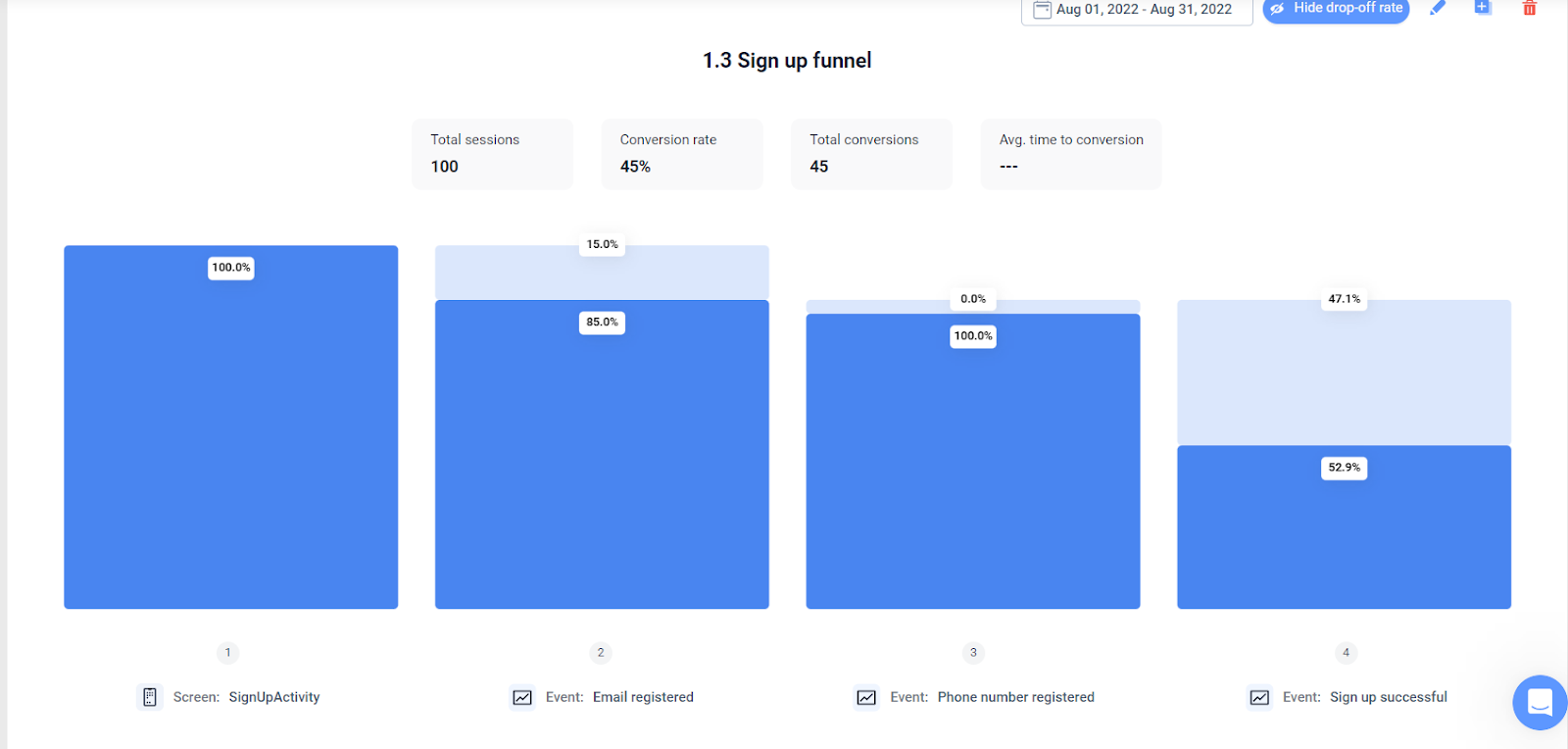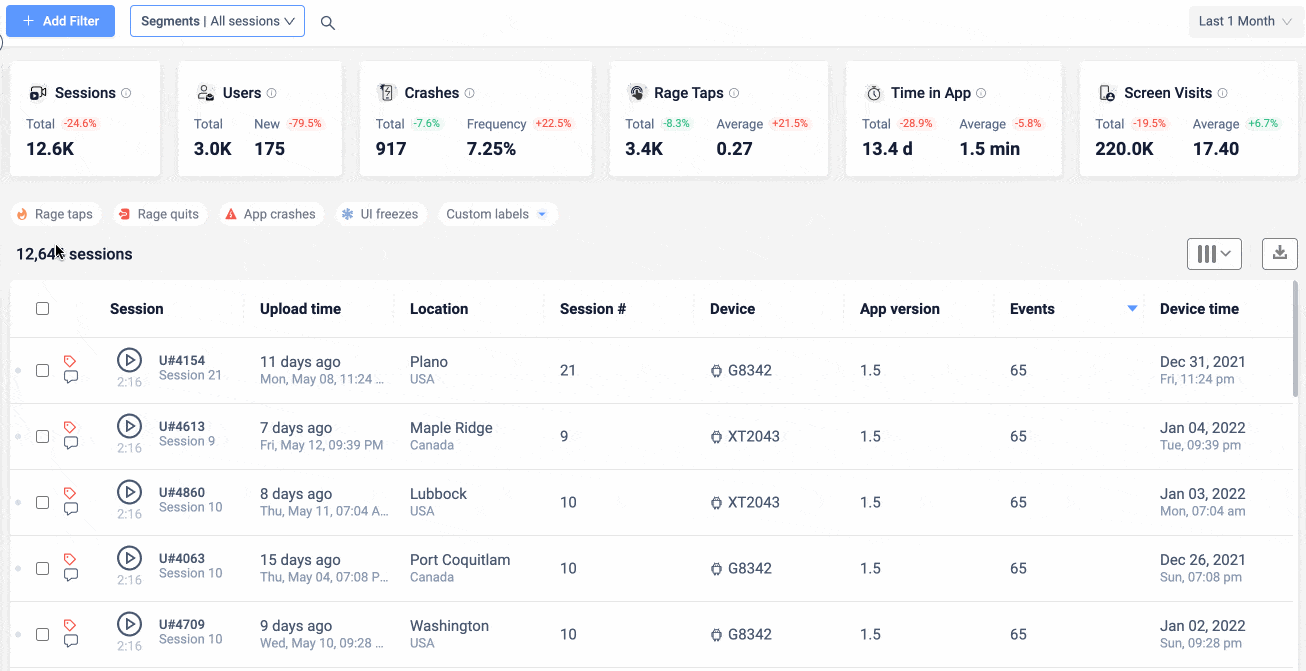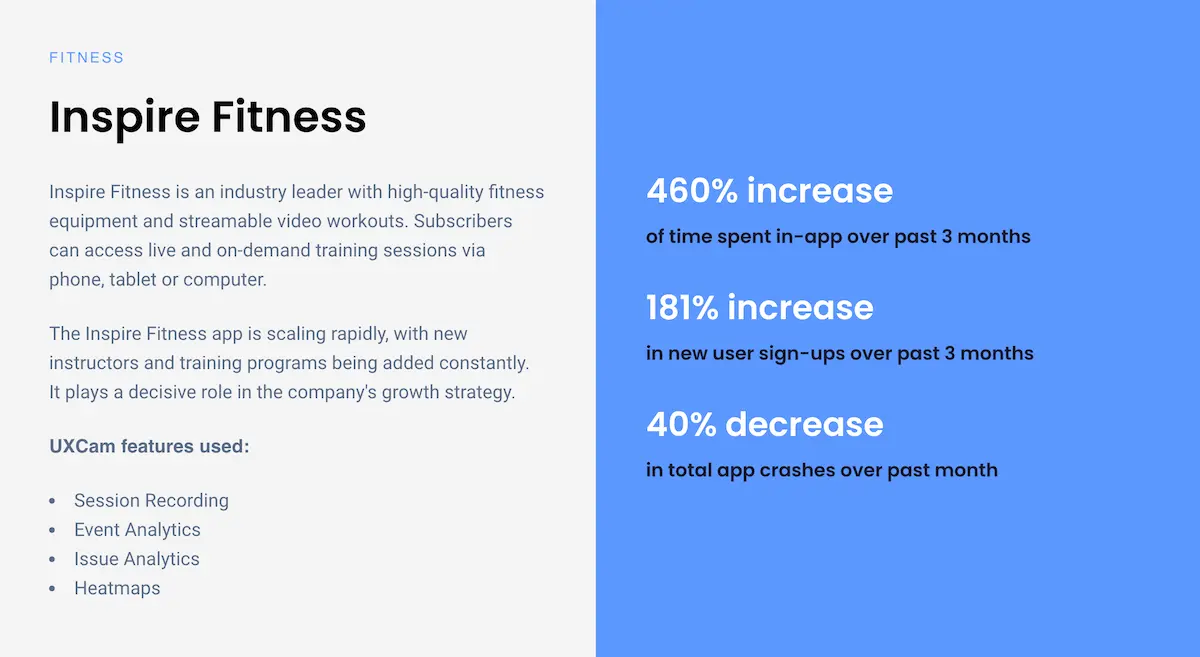Back to blog
6 MIN READ
Product Insights - Definition, Benefits & Practical Examples
PUBLISHED
13 November, 2023

Product Analytics Expert
No product is perfect at launch—they slowly become more perfect through iterations. This shouldn’t be a random process, though. Product insights should be the foundation of every iteration of the product.
In this UXCam guide, we will show you how to capture and analyze product insights with the aim of improving user experience and increasing app engagement. We will discuss how to track user behavior effectively, identify key opportunities and insights, and use those insights to drive product development.
Let’s get started.
What are product insights?
Product insights refer to the understanding gained from analyzing product-related data.
This data can come from various sources like user behavior analytics, customer feedback, and market research. The insights derived from this data can reveal how users interact with the product, what features they use the most, where they encounter difficulties, and much more.
These insights are important for mobile product app teams, as they can inform decisions about product development and strategy. They can help identify areas for improvement, inform A/B testing, guide new feature development, and ultimately enhance the overall user experience.
For example, here’s a screenshot of a funnel monitored with UXCam.


This funnel shows us what percentage of users make it from one funnel stage to another. This is a powerful product insight source—it allows you to identify potential bottlenecks that are preventing users from achieving their goals, and it can be used to inform product decisions.
Product insights example
Netflix
Netflix is known to be a leader in the streaming services space, but even they can benefit from collecting product insights.

Netflix ran a number of usability tests on children to see how they engaged with the app. They discovered that many children were trying to interact with the content in unusual ways—tapping on characters, trying to alter the story, and so on.
The product insights gained in these experiments led directly to the creation of Netflix’s interactive children’s content.
Benefits of product insights
Enhanced customer experience
Product insights allow you to understand your customers’ needs and preferences better. By analyzing user behavior, you can tailor your product to meet their expectations—enhancing the overall customer experience. It helps in creating a more personalized and engaging user interface, leading to increased user satisfaction and loyalty.
Improves the product
Insights derived from product usage can help identify areas of improvement. It could be a feature that users are not using as expected or a functionality that could be made more intuitive. By continually improving your product based on these insights, you make sure that your product stays relevant and continues to meet the needs of your users.
Keeps you ahead of your competitors
In the competitive landscape of mobile app development, staying ahead is important. Product insights give you a clear understanding of how your app is performing compared to others in the market. By continually monitoring these insights, you can identify trends and opportunities that can give you a competitive edge.
Ways to gather product insights
1. Website and app monitoring
Website and app monitoring can provide a wealth of product insights. You can track user behavior, identify popular content and features, identify dropoffs, and understand the customer journey. This data can help you optimize your website and app to better meet your customers’ needs.
Looking for an all-in-one mobile app monitoring tool?

UXCam arms mobile product teams with a suite of tools to track and analyze user sessions, app performance, and usage trends—perfect for insight-driven product development.
2. Feedback questionnaire
Feedback questionnaires are a direct way of gathering insights from your customers. They can be used to understand customer satisfaction, identify areas of improvement, and gauge customer loyalty. The key is to ask the right questions that provide actionable insights.
3. Online reviews
Online reviews are a goldmine of customer insights. They provide unfiltered feedback about your products or services. Analyzing these reviews can help you understand what your customers like and dislike, allowing you to make necessary improvements.
4. Competitor data
Analyzing your competitor’s data can provide valuable insights. You can understand their marketing strategies, product offerings, and customer engagement tactics. This can help you identify gaps in your own strategies and make necessary adjustments.
How to use product insights to inform product strategy
1. Identify your product insight sources
The first step of this process is identifying where your product insights will come from. You have all kinds of options available, including:
Website and app monitoring
Customer surveys and feedback
Social media listening
Review analytics
Competitor research
Industry research
For a well-rounded strategy, it’s best to incorporate a range of sources. This minimizes the risk of source-related biases and outliers (e.g., unhappy users are 10x more likely to leave a review than happy users).
You also need to think about your product and business goals. Not all insight sources are well-suited to all situations. For example, a monitoring tool like UXCam is great for generating product insights that support user engagement goals, while competitor analysis can be an effective way to support market share goals.
2. Fix flawed features
Small feature flaws can often lead to the biggest drops in user engagement. And because they’re so small, they often fly under the radar—wreaking havoc on your bottom line.
By deploying a combination of in-product surveys and product monitoring, you can start to gain insights that help you uncover these small (or big) flaws. You can use this information to tweak your UX, reduce user errors and drop-offs, and make small design changes with potentially massive payoffs.
A great example of this comes from Recora.

Their support team was getting a ton of tickets from users complaining of faulty products that (upon inspection) seemed to be working as expected. After implementing UXCam’s product analytics suite, the team found that the root cause was users pressing and holding a button that was meant to be tapped.
Adding a press-and-hold function to the button reduced support tickets by 142%.
3. Analyze and prioritize insights
Not all insights are created equal. It’s important to analyze and prioritize them based on their potential impact on your product strategy. This will help you focus on the most critical areas for improvement.
For example, JobNimbus used UXCam to track OS usage to prioritize development for the most used operating systems. This helped them reduce costs by reducing their overall development efforts and allowed them to focus on creating the best experience for the most used OS.
4. Develop innovative product ideas
Product insights can spark innovative ideas for new features or improvements. By understanding what your users need and want, you can develop solutions that meet these needs and set your product apart from the competition.
5. Use insights to inform the product roadmap
Your product roadmap should be informed by product insights. This ensures that your plans align with what your users want and need, and helps you make informed decisions about what features to prioritize.
A simple example? Feature request boards.
This is a form of user feedback where users can submit their feature requests. Many feature request boards include voting, which gives product teams quantitative insights into the potential impact of a given development decision.
6. Incorporate insights into product development
Finally, incorporate your insights into the product development process. This could mean adjusting your design based on user feedback, or changing your development priorities based on usage data.
By continually incorporating insights into your development process, you can make sure that your product stays relevant and valuable to your users.
Inspire Fitness used product insights from UXCam’s analytics tools to direct the development of their fitness app in a user-centric direction. With UXCam’s session replays and event analytics, they were able to identify the features, content, and instructors that users wanted most, and prioritize their development accordingly.
The result? A 460% increase in in-app user activity.

Conclusion
Product insights are a powerful tool that can significantly inform your product strategy. They provide a wealth of information that can guide your development process, ensuring that your app not only meets but exceeds user expectations. By effectively using product insights, you can create a product that truly meets the needs of your users.
UXCam is a powerful tool that helps you capture, analyze, and act on product insights. Get started with a free account and start optimizing your product today.
AUTHOR

Tope Longe
Product Analytics Expert
Ardent technophile exploring the world of mobile app product management at UXCam.
What’s UXCam?
Related articles
Tool Comparisons
UXCam vs Amplitude: A real comparison for mobile product analytics
Compare UXCam and Amplitude for mobile product analytics. See where event-based metrics work, where they fall short, and how UXCam's AI-powered product analytics platform reveals what's actually happening in your...

Begüm Aykut
Growth Marketing Manager
Product best practices
App Onboarding Guide: Top 10 Onboarding Flow Examples 2026
Take a look at 10 examples of apps that get user onboarding flows right. Get inspired by proven app onboarding approaches and improve your...

Jonas Kurzweg
Product Analytics Expert
App Analytics
Mobile App Tracking: Practical Guide & Best Tools [2026]
The best tracking tools for mobile...

Jonas Kurzweg
Product Analytics Expert

